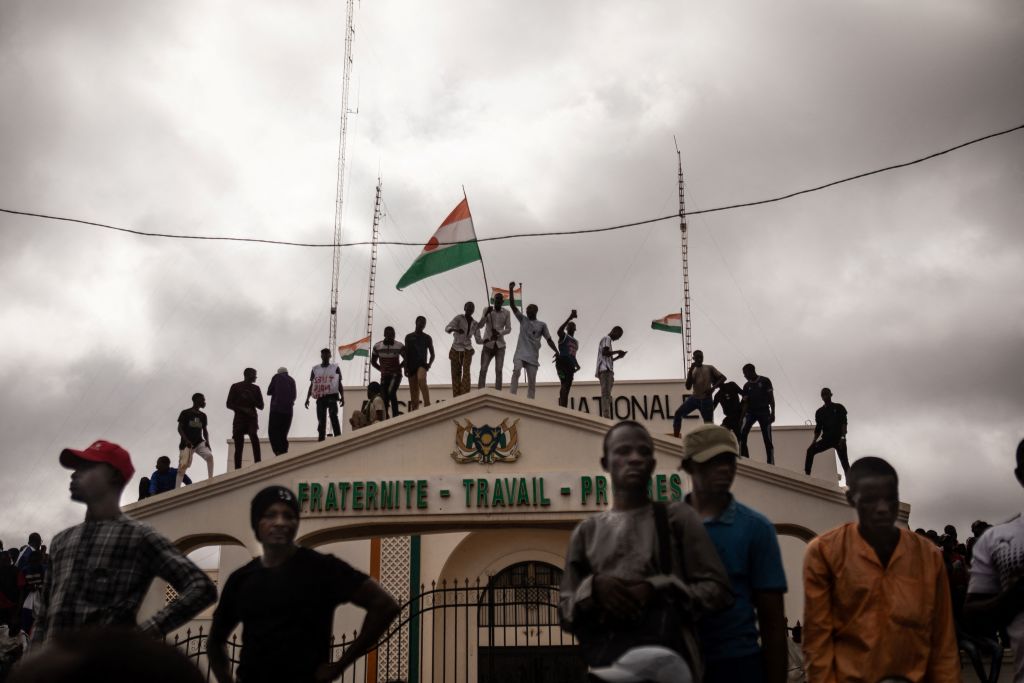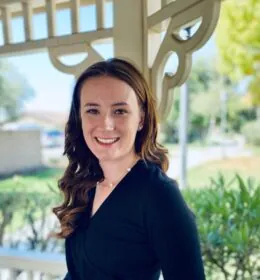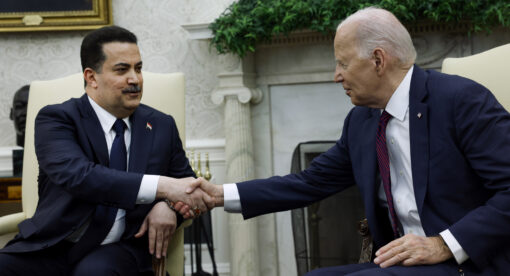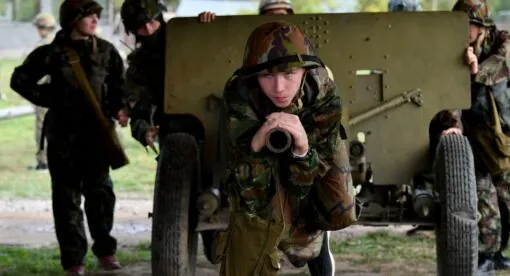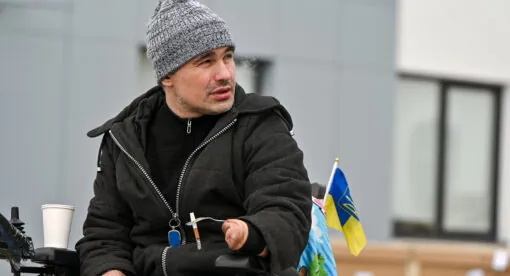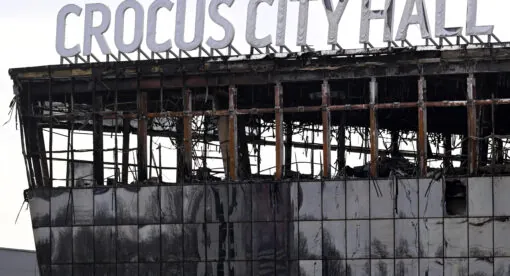In late July 2023, the presidential guard in Niger overthrew the country’s democratically elected president, Mohamed Bazoum, and is holding him hostage. More recently, the coup leaders announced they would be trying Bazoum for high treason on the basis of undermining state security. This charge carries the death penalty under Niger’s legal code.
This coup could undo hard-won gains for democratic governance and regional stability in West Africa. Niger has served as a geographic buffer between terrorist groups and numerous African countries, and it has been a valuable counterterrorism partner for the West. If the military junta that launched the coup is successful, al Qaeda and ISIS affiliates could metastasize across borders, significantly affecting the chances of long-term democratic stability in the area. In response to the coup, the U.S. and European Union should provide support for African-led attempts to restore and maintain peace and security in Niger and the broader region.
The Familiar Story of Coups in West Africa
Since the era of independence in the 1960s and 1970s, there have been over 200 attempted coups in West Africa – some lasting hours, others lasting weeks. The most recent successful coup occurred in the summer of 2022 in Burkina Faso. This pattern of coups against leaders, both democratic and authoritarian, is leading to a cycle of long-term destabilization. The fragility in West Africa that has driven these coups mainly springs from corrupt governance, inconsistent foreign involvement, economic instability, and humanitarian disasters. The Mali, Burkina Faso, and Niger tri-state area of the Sahel have been particularly affected by these military coups and have suffered the consequences of regional destabilization.
West Africa’s struggle with power and peace is built on a colonial history perpetrated by Western empires and defined by modern resource exploitation by China and Russia, who boast results-driven support (money, weapons, terrorist elimination) as they pitch and sign contracts built on personal gain. Russia has been found to have, at some level, contributed to the 2020 and 2021 coups in Mali and in Burkina Faso. Russia’s influence consists of disinformation campaigns, arms support, and assistance from private military companies. Moreover, when France’s Operation Barkhane ended in Mali, the withdrawal of French forces left a security gap that has been filled by Russian and paramilitary influence. These circumstances have led geopolitics in Africa to pivot on an East-West, post-Cold War line, even though stable peace and equitable economic relations require a different approach.
Domestic problems often provide more fuel for coups in West Africa. Democracy has remained a superficial endeavor in West African countries such as Mali, Burkina Faso, and Niger. Though democratic elections were held in Mali from 1964 until the 2012 Tuareg rebellion and in Niger from 1993 to the most recent coup in 2023, elections often see very low turnouts. In Mali, the last presidential election, voter turnout was around 30%, and in Niger, about 50% of those who met the voting age criteria cast their votes. In addition to low voter turnout, there is also minimal civic participation and few proper judiciary avenues, making any so-called democratic transition a transition in name only. Furthermore, surveys suggest that voter intimidation is at an all-time high, resulting in voters casting their ballots in line with key political elites and keeping them in power for multiple terms. The lack of consistent constitutional norms and peaceful power transfers has primed the Sahel region for political and military coups.
ECOWAS and the African Union: Forces for Change
With Nigerian President Bola Tinubu’s new role as chairman of the Economic Community of West African States (ECOWAS), there comes a possibility for a reinvigorated, comprehensive, and regionally led approach to promoting peace and stability in West Africa (especially given Nigeria’s leading role in the region). For instance, the ECOWAS intervention in the Nigerien coup – giving leaders of the coup one week to restore Bazoum or face possible military intervention – was a relatively rare move. The last intervention that ECOWAS carried out was in 2016 during the Gambian elections.
When he was installed as ECOWAS chairman, Tinubu vowed that the cycle of coups in Africa would be put to a halt. Tinubu stated, “We must stand firm on democracy. There is no governance, freedom, and the rule of law without democracy.” Though critics have claimed that this push for democracy comes as Tinubu is losing popularity at home and hopes to garner more favor with the international community, it is nonetheless a legitimate push for democratic practices that the international community should continue to support.
The African Union has intervened in inter- and intra-state governance issues and conflict across Africa in the past, including when it suspended Guinea from the African Union following a coup in 2019. However, the organization’s strong action needs strong follow-through. Sustained U.S. and international assistance channeled through ECOWAS and the African Union can support such follow-through. Any ECOWAS- and African Union-led efforts to safeguard against instability must prioritize factors that will bolster regional stabilization, including good governance and regional cooperation that extends to the local level.
Following the Nigerien coup, the African Union and ECOWAS insisted on the reinstatement of the deposed president. Meanwhile, the United States threatened to end support to Niger, and the European Union and France suspended aid and cooperation. This appeared to show a united front between the West and African regional groups in defending democracy and security in a volatile region of a continent rife with autocracy. While it seems unlikely that Niger’s most recent coup will turn into war in West Africa, it is imperative that the European Union and the United States continue to prioritize relations with the African Union and ECOWAS. Optimistically, sanctions and clear stances by neighbors will turn public opinion away from the putschists – giving actors for democracy favor in negotiations likely to happen between ECOWAS and Niger. The Malian military leader’s recent phone conversation with Russian President Vladimir Putin may suggest this united approach by European states, the United States, African Union, and ECOWAS is placing enough pressure on junta-run countries that they are now seeking outside assistance.
The Militant Threat
The series of coups in West Africa has opened the door for extremist groups to expand after being pushed out of Iraq and Syria. The lack of government continuity, clear constitutional structures, and proper democratic governance allowed Salafist Jihadist groups to fill power vacuums in the region.
The Islamic State in the Greater Sahara (ISGS) and al Qaeda-linked Jama’at Nusrat al-Islam wal-Muslimin (JNIM) thrive in the Mali-Burkina Faso-Niger tri-state. These groups are connected to other al Qaeda and ISIS outfits. However, Niger has served as a vast geographic buffer between the region’s new terrorist hot zone and North Africa, other West African states, and the Lake Chad Basin. Other states in the region have benefited from Niger’s anti-terrorism partnerships, including Libya, which is still healing; a number of West African states that have or are pursuing constitutional and civilian rule; and Nigeria, the richest and most populous country in Africa.
Current political uncertainty in Niger – a counterterrorism champion of the region and the West – directly impacts anti-terrorism efforts in West Africa. In consideration of the strength and rate of territorial expansion by ISGS and JNIM, efforts that promote stability must be unwavering and immediate or these jihadist groups will grow at an unprecedented rate. Only a strong and united response from the international community that legitimizes African institutions will discourage coups and the spread of insurgent activities in Mali, Burkina Faso, and Niger.
Freedom from autocratic rule and lack of ramifications for coups directly supports jihadist growth in West Africa. Al Qaeda and ISIS will continue to take advantage of instability in West Africa if Tinubu and/or ECOWAS and the African Union fail to unite West African states and international partners motivated by peace and stability in the region. Poor governance feeds distrust in the state, which feeds ISIS and al Qaeda’s recruitment in the region. In West Africa, recruitment is not founded on the radicalization of youth and other individuals to jihadist ideology but by the grievances these individuals have against their own governments.
Policy Recommendations
The conditions that lead to state fragility and political and military coups are dynamic and require a multifaceted approach; however, before the resulting violence is addressed, the root causes of that fragility should be addressed. For there to be any progress, countries plagued by recurring political coups must make radical changes for the better. This includes increasing civic engagement and increasing educational spending to assist in bolstering the economy and tackling youth unemployment. Governments should also work to install proper democratic practices, including formalized constitutions and judiciary practices. Countries that begin this process must have support from the international and regional communities.
The international community could aim sanctions more precisely to keep from harming innocent citizens who have not participated in or supported the coup. Responses by ECOWAS, the European Union, and France to Niger’s coup have choked regional banking and closed Niger’s borders. Instead, sanctions should target the finances and movement of coup members to avoid unwarranted economic backlash.
Regional groups such as the African Union and ECOWAS should adopt clear and concise policies on intervention that are unaffected by relationships held with country leaders or past legacies, nor should these policies be able to change as ECOWAS leadership changes. ECOWAS and the African Union should develop an internationally supported threshold for what classifies as a coup with clear steps for escalation. Escalation can mean imposing sanctions or intervening militarily. Once capacity is built up and regional institutions have the framework to combat coups, steps can be taken to combat subsequent security concerns and increasing extremist activity.
The United States must formally connect AFRICOM leadership and State Department conflict prevention, counterterrorism, and Africa bureaus with ECOWAS and the African Union. Due to the nature of al Qaeda and ISIS global terrorism networks and how the affiliates of these groups identify targets, especially as informed by foreign engagement grievances and/or colonial histories, it is imperative that counterterrorism efforts be comprehensive and disseminated through African and regional leadership.
Structural change that supports good governance in West Africa must be the center to this comprehensive, African-led approach. Good governance and fair interactions with security forces are the only way to quell terrorist recruitment of aggrieved citizens in West Africa. Non-radicalized individuals are engaging with offshoots of al Qaeda and ISIS for two main reasons: indiscriminate targeting by government forces and lack of access to basic services and rights of citizenship. These are pervasive problems, especially in the rural and northern regions of these states.
It is crucial that as ECOWAS, the African Union, and international partners address regional and state-level instability created by the coup in Niger to ensure that responsible intra-state governance and state security efforts are maintained. Adequate support from the United States and all international partners to the African Union and ECOWAS will make it possible to address state governance issues while encouraging responsible intra-state security and stability. This support must be transparent and engage local actors to strengthen the trust whose fragility has led to coups in the first place.
Riley Moeder is a Senior Analyst for the Special Initiatives program at the New Lines Institute, focusing her research on North Africa and Strategic Rivalries. Prior to joining the New Lines Institute, Riley was a program assistant for the United States Institute of Peace in the Middle East and North Africa department. She previously worked at American Enterprises Institute in the Critical Threats Department, researching non-state actors in the Sahel. She also studied in Strasbourg, France, where she researched international human rights law and refugee policy.
Tammy Palacios is a Senior Analyst leading the Priority Sustainable Counterterrorism initiative at the New Lines Institute. Palacios previously served as Program Head for the Nonstate Actors program at New Lines, where she worked in the field of violent and non-violent non-state actors. Prior to joining the New Lines Institute, Tammy served as Project Lead for the MENA Research Team at TTCSP, where she managed two international teams collecting data on think tanks and civil society organizations in the MENA region. Tammy also spent time on Syria and ISIS portfolios at the Institute for the Study of War where she focused on Salafi-Jihadist militant groups operating in Syria. She tweets at @TammyPalacios10
The views expressed in this article are those of the author and not an official policy or position of the New Lines Institute.

